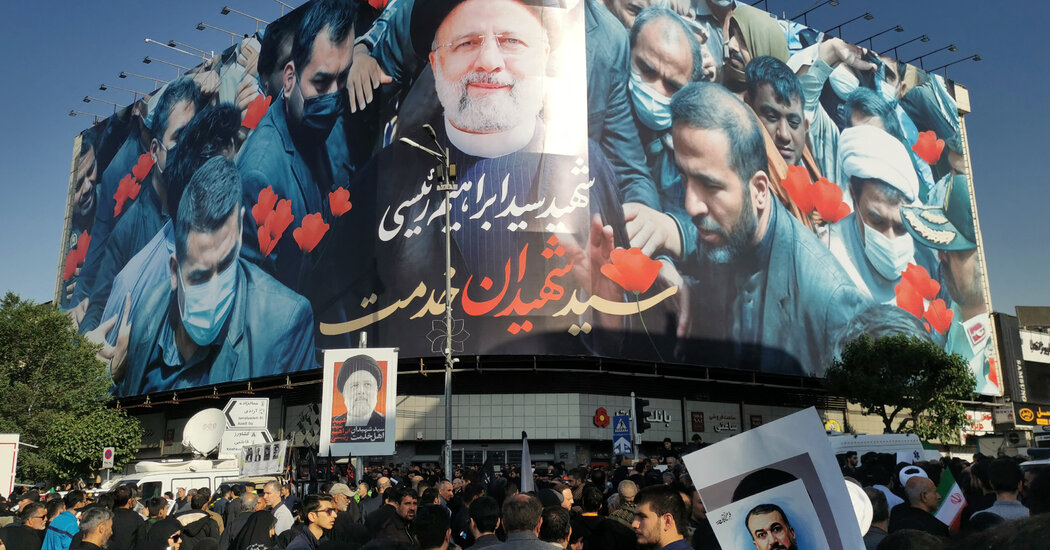
Iran's Supreme Leader Ayatollah Ali Khamenei on Wednesday held funeral prayers for the country's president who died in a helicopter crash, as thousands of Iranians filled the streets of Tehran in an official day of mourning.
The president, Ebrahim Raisi, 63, was killed along with Iranian Foreign Minister, Hossein Amir Abdollahian, 60, and five other travelers who were traveling with them on Sunday. The funeral began Tuesday with a procession in Tabriz, the closest major city to the crash site in northwest Iran. The bodies of Raisi and the others killed were then taken to the holy city of Qom and Tehran, the capital, ahead of Wednesday's events.
Iranian security forces have implemented severe restrictions on vehicle movement and parking in the area where the funeral processions would begin, Tehran police chief Colonel Abdolfazl Mousavipour said on state television overnight. State television also reported that public transport would be free on Wednesday – declared a national holiday – to allow people to attend the funeral.
On Wednesday morning, state media broadcast footage of huge crowds making their way to Tehran University, where flag-draped coffins were housed in a large hall.
Ayatollah Khamenei, 85, entered with his entourage, placing his staff in front of the coffins before performing prayers. His words were broadcast over loudspeakers to the crowd standing outside who bowed their heads in prayer, state media footage showed.
Raisi had been considered a potential candidate to succeed the supreme leader, whose health is deteriorating. After reciting prayers, Ayatollah Khamenei hugged one of Mr. Raisi's sons, a video on state media showed, stroking the boy's head.
The funeral procession then began. State media said the ceremony, which will take place at 4pm local time, will be attended by more than 40 “high-ranking foreign delegations”, including 10 heads of state.
It was not immediately clear which foreign leaders would attend. Vyacheslav Volodin, speaker of the lower house of the Russian parliament, arrived at Tehran's airport on Wednesday, state media reported. Armenian Prime Minister Nikol Pashinyan and Turkish officials were also expected to attend the events, state news outlets reported.
At least two of the Iranian-backed militant groups in the region – Hamas and Hezbollah – sent representatives to Tehran for the funeral.
In a speech at the funeral ceremonies, Ismail Haniyeh, who leads Hamas's political wing from exile, recalled meeting Raisi in Tehran during the holy month of Ramadan. In that meeting, Haniyeh said, Raisi stressed Iran's “unchangeable” commitment to the Palestinian cause, according to Iranian state media.
Mr. Haniyeh's presence came despite the prospect of an imminent arrest warrant from the International Criminal Court on charges of war crimes and crimes against humanity. Hamas is a key part of the proxy network that Iran has developed and supported in the region. The militant group's attack on Israel in October and Israel's subsequent war in Gaza have dramatically escalated tensions that prompted Israel and Iran to exchange rare direct attacks last month.
The Lebanese militant group Hezbollah, which on Monday commemorated Raisi as a “big brother”, sent Naim Qassem, its deputy secretary general, to the funeral.
As thousands of government supporters attended funerals and memorial services across Iran, many Iranians who opposed the government and despised Raisi for his record of human rights abuses showed apathy, and some even applauded his death.
As investigators probe what caused the helicopter to crash – state media reported it was due to a “technical failure,” and the Iranian military is leading a commission – more details have emerged about its final moments .
State media reported that Gholamhossein Esmaili, Iran's presidential chief of staff, had said weather conditions were normal when the helicopter took off on Sunday. Mr Esmaili was on board one of two other helicopters traveling with Mr Raisi and returned home safely.
About 45 minutes into the flight, Esmaili said, the pilot of Raisi's helicopter told the convoy of planes to increase altitude to avoid a cloud. But Mr. Raisi's helicopter has disappeared.
Mr Esmaili told state TV that several attempts to establish radio contact had failed. One of the passengers on Mr. Raisi's helicopter, a local prayer leader from Tabriz, eventually answered the phone and said the helicopter had crashed. The prayer leader, Mohammad Ali Ale-Hashem, later died.
Farnaz Fassihi, Leily Nikounazar AND Euan Ward contributed to the reporting.
